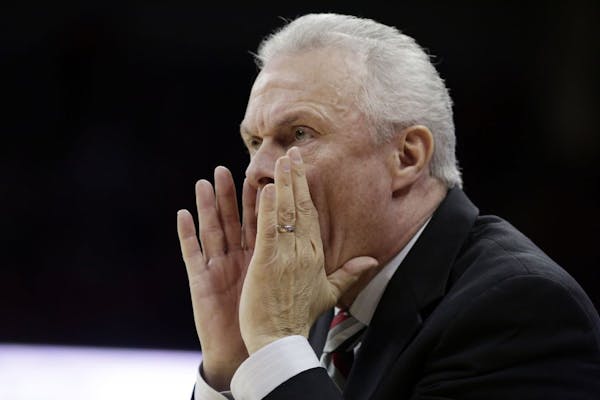Looking at the Gophers' men's basketball roster, one name instantly stands out as the potential saving grace for a team that has slipped from a No. 8 national ranking to unranked -- one presence who creates hope that a team, reeling after six losses in eight games, can reclaim its form for the stretch run.
Trevor Mbakwe.
After all, Mbakwe -- a 6-8, 245-pound sixth-year senior who could play professionally after the year is over -- is the Gophers' most imposing inside presence and most proven scorer.
But as Minnesota heads into Thursday's critical game against Wisconsin at Williams Arena, Mbakwe has been underutilized in the Gophers' past four games, raising yet another question about Minnesota's capability of turning its season around. Mbakwe has touched the ball on offense less than any Minnesota starter except for point guard Andre Hollins during that span -- even Rodney Williams, who didn't play Sunday against Illinois because of a shoulder injury but practiced Tuesday and Wednesday and should play against the No. 20 Badgers.
"[Mbakwe] is a very important part of our offense so [opponents'] first line of defense is to limit his touches," Gophers coach Tubby Smith said. "We do try to get it to him inside, but a lot of times people are geared to taking that away from us."
The inability to get Mbakwe the ball is hardly the Gophers' only problem. Poor shooting, multiple turnovers and lackluster perimeter defense all contributed to their tumble out of the Top 25. With Wisconsin going the opposite direction -- entering the AP poll for the first time since Week 2 at No. 20 on Monday -- the Gophers have another opportunity to notch a signature victory and end a two-game skid before it could get a lot worse with tough games at Iowa, at Ohio State and against Indiana at home looming afterward.
One of the major keys to turning things around is getting more out of Mbakwe, something the Gophers tried to do in Sunday's 57-53 loss to Illinois. After Mbakwe had received only 68 total touches on offense in the previous three games -- significantly fewer than any other starter -- he touched the ball 35 times against the Illini, with almost half of those (17) occurring in or around the paint, where he can be successful.
The result was a 13-point, 10-rebound game -- his first-double-double in the Big Ten since beginning conference play with five in his first six league games. The downside was his four turnovers, including a bad cross-court pass late in the game after Illinois continued a second-half trend of double- teaming him. The turnover contributed to the loss after his good early work helped the Gophers build a double-digit first-half lead.
The Gophers clearly emphasized getting the ball inside against Illinois, helped by needing to play Mbakwe at power forward instead of center with Williams sitting out. Elliott Eliason, who started at center, was active in looking for Mbakwe from the high post.
"I just kind of recognized that Trevor's guy was trying to deny him so hard on that side and we get a quick reversal and were able to get it to him," Eliason said. "I'm really comfortable up there, playing from that position, so I was able to exploit that as much as I could."
But getting the ball inside to Mbakwe has been an ongoing struggle for the Gophers. Point guard Andre Hollins said that's because with opponents focusing on taking away that entry pass, the margin for error is slim.
"It's like a split second that he's open," Hollins said. "The [opposing] big man is rooting him out and sometimes [Mbakwe] gets the call and sometimes he doesn't, but it's a risky pass to throw in there when he's fighting for position."
Smith said Mbakwe, through a lot of hard work and strengthening, has improved at holding his position against defenders often significantly bigger. Now Mbakwe has to learn to be more patient as he works to post up in the right spot and demand the ball.
"It's just a different team and a different role than I've had the last couple of years," Mbakwe said, noting the discrepancy in touches. "Part of it is me just being more aggressive, finding ways to get open and finding ways for my teammates to get me the ball. It works both ways."

Rare and fatal brain disease in two deer hunters heightens concerns about CWD

Five home runs, including two by Julien, power Twins past White Sox
Yoshinobu Yamamoto's 6 shutout innings help Dodgers finish sweep, defeat Nats 2-1

